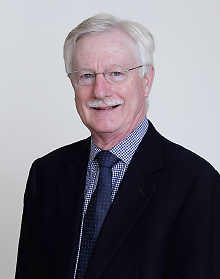NIAAA Track Focuses on Pharmacotherapy, Alcohol Disorder Guidelines
Abstract
The National Institute on Alcohol Abuse and Alcoholism will hold a four-day research track on the theme “Advances in Treatment of Alcohol and Co-occurring Psychiatric Disorders Across Patient Populations and Settings” at this year’s annual meeting.

George Koob, Ph.D., director of the National Institute on Alcohol Abuse and Alcoholism (NIAAA), said that NIAAA worked with APA’s Scientific Program Committee to identify experts and the most popular research topics for a special annual meeting track on alcohol use disorders.
At APA’s annual meeting in Toronto in May, the National Institute on Alcohol Abuse and Alcoholism (NIAAA) will sponsor a four-part symposium and keynote lectures, workshops, and forums to update psychiatrists on the latest advancements in research on alcohol addiction and treatment. NIAAA Director George Koob, Ph.D., talked to Psychiatric News to give APA members an overview on what to expect.
PN: Why is sponsoring a research track at APA’s annual meeting important for NIAAA?
GK: NIAAA is pleased to be sponsoring a research track at this year’s annual meeting. This track represents a great opportunity for us to share some very exciting research findings on alcohol use disorders with psychiatrists, [who are] on the front line of mental health care.
PN: What is the focus of this year’s NIAAA-sponsored research track?
GK: Our research track will focus on how alcohol research can inform and improve the treatment of co-occurring alcohol use and psychiatric disorders across patient populations and settings.
This is important because—as suggested by research—about 1 in 5 individuals seeking psychiatric treatment has a co-occurring substance use disorder, and the substance used is more likely to be alcohol. Of the individuals seeking treatment for an alcohol use disorder, about 2 in 5 have a mood disorder and 1 in 3 has an anxiety disorder.
PN: What specific topics will be discussed?
GK: We will host presentations on the underlying neurobiology of alcohol use disorders, new trends in pharmacotherapies, posttraumatic stress disorder, binge drinking among youth, fetal alcohol syndrome, and the combined use of alcohol and marijuana by young people. Treating co-occurring alcohol use and psychiatric disorders is complex, and our research track reflects that complexity.
PN: Which do you think will be the most popular topics?
GK: If history is any predictor, all of the topics in our research track will be popular. … But if I had to pick one topic, it would probably be the recent developments in our search for novel pharmacotherapies for alcohol use disorders and co-occurring psychiatric disorders.
PN: Why pharmacotherapies?
GK: I think APA members will be keen to hear about our medication development work, since psychiatrists are experts at using pharmacotherapy as an effective tool in the treatment of mental health disorders. Pharmacotherapies will be a key theme in two of our keynote lectures, one by me and the other by Barbara Mason, Ph.D., director of the Pearson Center for Alcoholism and Addiction Research at Scripps Research Institute. NIAAA will also sponsor a workshop focused on updated guidelines for prescribing medications for alcohol use disorders.
PN: What additional information on NIAAA-sponsored events do you think may be of great interest to APA members at the meeting?
GK: Back by popular demand is our workshop on NIAAA’s screening and brief intervention guide “Helping Patients Who Drink Too Much: A Clinician’s Guide.” This is an evidence-based, easy-to-use guide for identifying patients who may have an alcohol addiction. It provides advice on how to manage mild-to-moderate alcohol problems in the context of everyday psychiatric practice.
Also, we will be screening a documentary film titled “Anonymous People,” directed by Greg Williams. It is about the 23.5 million Americans living in long-term recovery from a substance use disorder. I, along with Nora Volkow, M.D., director of the National Institute on Drug Abuse, will lead a discussion about the film after the screening.
PN: What do you want APA members to take away from the NIAAA-sponsored research track’s symposium and programs?
GK: APA members and other psychiatrists who attend our research track sessions will take home a deeper understanding of the underlying neuroscience of alcohol use disorders and a working knowledge of the latest evidence-based clinical techniques for treating alcohol use and co-occurring psychiatric disorders. I invite all conference goers to attend—they will not be disappointed! ■



